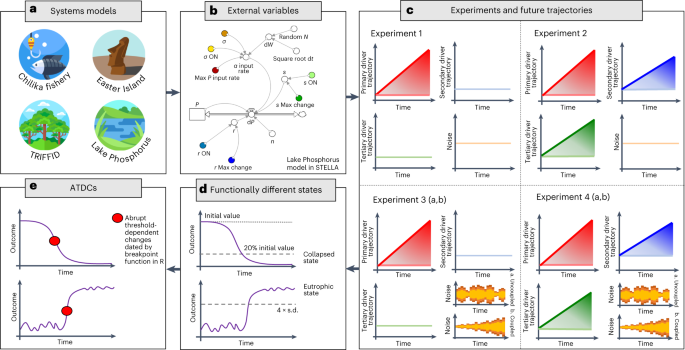I did my best to summarize the text below in the title, with the limited word count of a title, here is a sample of the text, the article is open access and you should read it.
Don’t Read Scientific Articles Often?
That is okay, we are here to teach each other what we know.
If you are unfamiliar with scientific articles, this is what is called a “review article” and more specifically this would be a systematic review article. It is not research itself, but it is a collection of research articles put together to create a larger narrative.
I want people here to learn more about scientific articles if they were never in academia so they can begin using them more as sources for their work and general understanding; instead of relying on very bad science journalists who write articles that don’t cite the papers often, and totally misunderstand the scope or point of the article; and are rewarded for misinterpretation that leads to sensationalism.
This is not sensationalism, this is a realistic look at the state of our world, using scientific articles cited to support every point made. And the outcome of the review is an explanation of how the ecosystem is collapsing. Climate instability is a single factor, the feedback loops that maintain our various ecosystems are falling apart quickly.
How and why do I know so much about this topic? I’m in love with very talented ecologist with a masters in ecology, specializing in fungi communication via chemicals (and in computer terms the protocols used to talk to other fungi or even bacteria).
Its unrequited but she is never-the-less a close friend and has introduced me to many ecologists so I have had long conversations with ecologists around the world. And the conversations are always very fucking grim; and when I step back and review the conversations in the way this article reviews research papers, the picture is pretty clear, global warming, or better said climate instability, is a red-herring to make you not see the much much much worse problem we are facing. Focusing on a single molecule COˆ2, or even methane which is far worse, makes the problem seem solvable by capitalism. But capitalism is the software running that is using up the resources, and crashing the planet like a bad piece of software on a computer; an infinite loop, checking far too few variables and we are not allowed to kill -9 it. We just get to watch it slowly crash the “Deep Thought” computer, or a less nerdy way to say it: Earth, a prettier way to say it: Terra (because maybe Hitchhikers Guide viewing the earth as a computer is useful way to view this problem).
An Excerpt From The Scientific Article
UK Chief Scientist John Beddington’s argument that the world faced a ‘perfect storm’ of global events by 2030 has now become a prescient warning. Recent mention of ‘ghastly futures’, ‘widespread ecosystem collapse’ and ‘domino effects on sustainability goals’ tap into a growing consensus within some scientific communities that the Earth is rapidly destabilizing through ‘cascades of collapse’. Some even speculate on ‘end-of-world’ scenarios involving transgressing planetary boundaries (climate, freshwater and ocean acidification), accelerating reinforcing (positive) feedback mechanisms and multiplicative stresses. Prudent risk management clearly requires consideration of the factors that may lead to these bad-to-worst-case scenarios. Put simply, the choices we make about ecosystems and landscape management can accelerate change unexpectedly.
The potential for rapid destabilization of Earth’s ecosystems is, in part, supported by observational evidence for increasing rates of change in key drivers and interactions between systems at the global scale (Supplementary Introduction). For example, despite decreases in global birth rates and increases in renewable energy generation, the general trends of population, greenhouse gas concentrations and economic drivers (such as gross domestic product) are upwards—often with acceleration through the twentieth and twenty-first centuries. Similar non-stationary trends for ecosystem degradation imply that unstable subsystems are common. Furthermore, there is strong evidence globally for the increased frequency and magnitude of erratic events, such as heatwaves and precipitation extremes. Examples include the sequence of European summer droughts since 2015, fire-promoting phases of the tropical Pacific and Indian ocean variability and regional flooding, already implicated in reduced crop yields and increased fatalities and normalized financial costs.
The increased frequency and magnitude of erratic events is expected to continue throughout the twenty-first century. The Intergovernmental Panel on Climate Change (IPCC) Sixth Assessment Report concludes that ‘multiple climate hazards will occur simultaneously, and multiple climatic and non-climatic risks will interact, resulting in compounding overall risk and risks cascading across sectors and regions. Overall, global warming will increase the frequency of unprecedented extreme events, raise the probability of compound events15 and ultimately could combine to make multiple system failures more likely. For example, there is a risk that many tipping points can be triggered within the Paris Agreement range of 1.5 to 2 °C warming, including collapse of the Greenland and West Antarctic ice sheets, die-off of low-latitude coral reefs and widespread abrupt permafrost thaw. These tipping points are contentious and with low likelihood in absolute terms but with potentially large impacts should they occur. In evaluating models of real-world systems, we therefore need to be careful that we capture complex feedback networks and the effects of multiple drivers of change that may act either antagonistically or synergistically. Prompted by these ideas and findings, we use computer simulation models based on four real-world ecosystems to explore how the impacts of multiple growing stresses from human activities, global warming and more interactions between systems could shorten the time left before some of the world’s ecosystems may collapse.



Oh, and there is no fucking way we can model this; its too complex. Its not like modeling what happens when too much COˆ2 gets into the atmosphere. These feedback loops are too interconnected and too complex to really understand; we just know they are destabilizing and have been; and its accelerating quickly.
Talking to ecologists all over and even just scientists, having lived on multiple continents now, the common theme talking to any scienitst or farmer is: “the weather just doesn’t make sense anymore, its not predictable.”
And what the ecologists say kinda just makes me want to curl up into a ball and cry but no one to hold me.
Maybe the not knowing what will happen exactly is the most scary part. It also seems to be more and more inevitable. I feel like curling up into a ball and crying too. And that is fine sometimes I think. Sometimes you need to do that for a while.
But after that, we should get up. We should not lose our will to fight and deal with this. Whatever happens, everyone, ordinary people, can still fight to keep their compassion and humanity. I think that is how we can survive the most difficult circumstances.
I think as a species, that is why we were initially so successful, because we were able to cooperate, share and take care of each other. I think things are going wrong now because we, and especially the people in power, have lost that. It is not part of the capitalistic model. People treated with compassion will usually be more compassionate. Radical compassion, even when it is difficult, will lead to the collapse of this model and our survival.
We need to make it easier to help people we have the technology, we need the people to invest the time, and at the very least alleviate suffering.
Yes, definitely. I think a lot of the effort to develop technologies that are used for things such as more effective advertisements etc. should be redirected towards developing technologies that help humanity. However, it ys difficult to get there.
I myself spend a lot of effort and time on getting grants to research this kind of technology and it is almost impossible to do so. I am now looking for ways to make enough money so I can take time off and do it in my own time. Each time we get the reply that the ideas are great, but we get rejected for political reasons (e.g., we did not obtain enough money from business, our partners are too much from the same region). It is really frustrating.